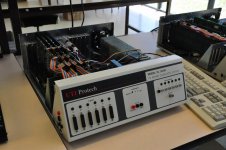Relax, I am not doing anything evil. I own the hardware and I own the software dongle which does not work anymore. I even found one of the original programmers who recompiled some of the programs to run without the dongle but there were a few that he didn't have the source code for. The company is long gone, you can barely find a trace of them on the internet.
I need a DOS debugger/Disassembler??? so that I can either figure out how the dongle worked so I can bypass it or to compare files between the ones that were recompiled to not use the dongle and the ones that require the dongle so I can learn from the changes that were made.
I am having a hard time finding one that will work in Vista that can handle DOS .exe files. MS-Debug only does .com files and most others I run across don't seem to do DOS programs but I know very little about this stuff.
What type of program should I be looking for and does anyone know of any free versions?
Thanks again,
Russ
I need a DOS debugger/Disassembler??? so that I can either figure out how the dongle worked so I can bypass it or to compare files between the ones that were recompiled to not use the dongle and the ones that require the dongle so I can learn from the changes that were made.
I am having a hard time finding one that will work in Vista that can handle DOS .exe files. MS-Debug only does .com files and most others I run across don't seem to do DOS programs but I know very little about this stuff.
What type of program should I be looking for and does anyone know of any free versions?
Thanks again,
Russ

